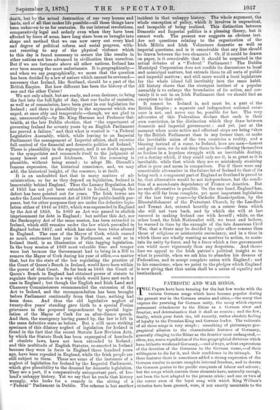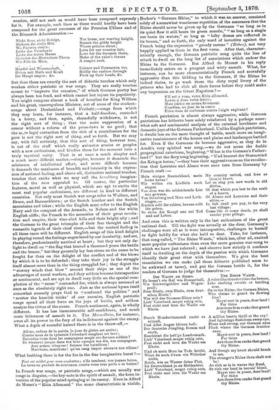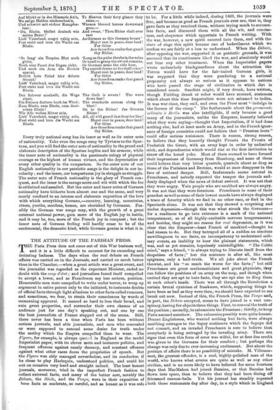PATRIOTIC AND WAR SONGS.
THE Papers have been teeming for the last few weeks with the various German songs which have become popular during the present war in the German armies and cities,—the many that express the yearning for German unity, the many which express permanent attachment to the Rhine as a German river and frontier, and determination that it shall so remain ; and the few, finally, which pour forth the, till recently, rather obsolete feeling of loyalty to the Prussian King and German leader. The rationale of all these songs is very simple ; something of picturesque geo- graphical allusion to the characteristic features of Germany, generally clinging to the Rhine as the frontier most endangered,— of ten, too, warm repudiation of the fine geographical divisions which have hitherto weakened Germany,—and always, ardent expressions of the devotion of the Germans to the German cause,—of their willingness to die for it, and their confidence in its triumph. To these features there is sometimes added a strong expression of the German resolve to secure complete internal freedom, and to devote the German genius to the pacific conquests of labour and science ; but the songs which contain these elements have, naturally enough, not been the best adapted to the present crisis ; and one or two of the verses even of the loyal song with which King William's victories have been greeted, were, if not exactly unsuitable to the cession, still not such as would have been composed expressly for it. For example, such lines as these would hardly have been composed for the great successes of the Prussian Uhlans and of the Bismarck Administration :—
Nicht Rose, nicht Reisige, Sichern die steile Hot: Wo Ffirsten steh'n ; Liebe das Vaterlands Liebe des freien Manns .Griinden des Herrschers Thron 'Wie Fels im Meer.
. . . . . Handel nod Wissonschaft, Ebben mit Muth and Kraft Ihr Haupt empor ; &c. Nor horse, nor warring knight, Secure the giddy height Where princes stand ; Love for our country fair, Love for the freemen there, Make of the ruler's throne A seagirt rock.
Science and Commerce, too, Boldly the surface through Push up their heads, &c.
But then these are exactly the sort of didactic touches which only weaken either patriotic or war songs. They are really touches meant to "improve the occasion," of which German poetry has always been too fond, and which cannot but injure its popularity.
You might compose almost a book of homilies for King William and his great, unscrupulous Minister, out of some of the student-
songs about Deutschland and Freiheit;—songs from which they may learn, for instance, that a half-freedom, conceded in a hurry, and then, again, shamefully withdrawn, is not the right sort of thing ; that the mere suppression of a censor without a reform of the press-laws is no good ; that the mare legal extraction from the rich of a contribution for the
poor is not the right sort of thing, and so forth. But we may say, with full certainty, that this sort of thing, however true, is not of the stuff which really animates armies or peoples with a new enthusiasm, and kindles them for the moment into a
truly mystical uuity. That is at once a much simpler and a much more difficult matter,—simpler, because it demands the
minimum of intellectual effort, and more difficult because it demands the maximum of breadth and intensity in the expres-
sion of national feeling, and above all, distinctive national touches, touches that excite what we may call the hereditary imagina-
tion of the race appealed to. Of course, the particular features, moral as well as physical, which are apt to excite the most real popular enthusiasm, are different in kind in different countries. Not only must Scotch war songs refer to Wallace, and Bruce, and Bannockburn ; or the Scotch heather and the Scotch mountains and lakes ; while the English must refer to the English Navy and the conquest of the Armada, to Nelson and the white English cliffs ; the French to the memories of their great revolu- tion and empire, their vine-clad hills and their bright city ; and the German to the great triumphs of their free thought and the romantic legends of their chief river,—but the central feeling in all these cases will be different. English songs of this kind delight in playing round the feelings engendered by our insularity, and are,
therefore, predominantly nautical at heart ; but they not only de- light to dwell on "the flag that braved a thousand years the battle and the breeze," but they generally lay less stress on the cause to be fought for than on the delight of the conflict and of the blows by which it is to be defended ; they take their joy in the struggle itself almost more than in the thing struggled for ; they depict the
" stormy winds that blow " around their ships as one of the advantages of naval warfare, and they seldom become introspective or sentimental, and are apt to dwell very little on the special com- plexion of the " cause" contended for, which is always assumed at once as the absolutely right one. Just as the national hymn itself
somewhat coarsely prays God to 1., confound the politics " and
• scatter the knavish tricks' of our enemies, English patriotic songs spend all their force on the joys of battle, and seldom analyze the virtue of the cause. French sentiment, again, is wholly different. It has less immeasurable self-confidence, and much
more bitterness of assault in it. The Marseillaise, for instance, owes all its power to the fury of its indictment against the enemy.
What a depth of scornful hatred there is in the throw-off,—
Allons, enfans de la patrie, le jour de gloire eat arrive ; Centre nous de la tyrannie l'etendard sanglant est love ; Entendez-vous dana lee campagnes mugir COB feroces soldats ?
Its viennent jusque dans vos bras egorger vos file, vos compagnes.
Aux armes, citoyens ! formez vos bataillone ! Marchons, marchons ! qu'un sang impur abreuve nos sillons!
What loathing there is for the foe in the fine imaginative burst ?— Tout est soldat pour ma combattre; s'ils tombent, nos jenttes heros, La terra en produit de nouveaux, contra vous tons press it se battre !
In French war songs, or patriotic songs, —which are usually war songs in disguise,—the key-note is the spirit of assault, the keen in- vective of the popular mind springing at its enemy. Even in Alfred
de Musset's " Rhin Allemand " the same characteristic is visible. 1 Becker's " German Rhine," to which it was an answer, consisted
solely of a somewhat wearisome repetition of the assurance that the Rhine should never be given up by the Germans "so long as in its quiet flow it still bears its green mantle," " so long as a single
oar beats its waters," so long as " lofty domes are reflected in its bosom," and so forth, the only word of invective against the
French being the expression " greedy ravens " (Raben), not very happily applied to them in the first verse. After that, character-
istically enough, the German patriotic song quits the line of attack to dwell on the long list of associations which endear the Rhine to the Germans. But Alfred de Musset in his reply immediately enters on a pungent and witty assault. What, for instance, can be more characteristically French and scornfully aggressive than this bidding to the Germans, if the Rhine be indeed theirs, to go wash there the dirty royal livery of the princes who had to club all their forces before they could make any impression on the Great Napoleon ?—
S'il est a vous, votre Rhin allemand,
Lavez-y done votre livree ; Mais parlez -en mins fierement.
Combien, an jour de la cures Etiez-vous de corbeaux centre l'aigle expirant?
French patriotism is almost always aggressive, while German patriotism has hitherto been solely reinforced by a perhaps some- what soft and sentimental analysis of the external loveliness and domestic joys of the German Fatherland. Unlike English patriotism, it dwells less on the mere thought of battle, much more on imagi- native reminiscence of the homes and plains and landscapes battled for. Even if the Germans do become aggressive, as they do in Arndt's very spirited war soug,—we do not mean the feeble geographical catechism, beginning," What is the German's Father- land ?" but the fiery song beginning, "Und brauset der Sturmwind des Krieges heran,"—they base their aggressiveness on the recollec- tion that Lorraine and Alsace were once torn from Germany by French craft :—
Mein einiges Deutschland, mein fr•eies heran !
Wir wollen sin Liedlein euch singen Von dem was die schleichende List uns gewann, Von Strasburg und Metz und Loth- ringen,— Zuriick sollt ihr zahlen, heraus sollt ihr geben, So stehe der Kaupf uns auf Tod und auf Leben. My country united, and free as thou'rt brave, Let us sing you new words to old ditties, Of that which you lost to the craft of a knave,
Of Alsace and Lorraine and their cities,—
In full shall you pay, to the very last village; Come life or come death, ye shall render your• pillage.
And even this is written only in the last enthusiasm of the great national duel. Till the fight was actually at the door, Germany's challenges were all as it were introspective, challenges to herself to fight boldly for what she held so dear. Take, for instance, that song called, " The Rhine Watch," which has, after all, excited more popular enthusiasm than even the more genuine war-song to which we have just referred ; and observe how strictly it confines itself to dwelling on the depth of the passion with which Germans identify their great river with themselves. We give the best translation we can make (all those hitherto published seem to be awkward or tame), and put the German beside it, for the readers of German to judge for themselves :—
Dix Wanes AM RUBEN.
Es brans% ein Ruf wie Donnerhall, Wie Schwertgeklirr und Wogen- prall : Zum Rhein, zum Rhein, zum dent- schen Rhein !
Wer will des Stromes Hiiter sein ? Lieb' Vaterland, magst ruhig sein, Feat steht und treu die Wacht am Rhein.
Durch Hunderttansend znckt es schnell, Und Aller Angen blitzen hell: Der deutsche Jiingling, fromm and stark, Beschirmt die beil'ge Landesmark. Lieb' Vaterland, magst ruhig sein, Feat steht und treu die Wacht am Rhein.
Und ob mein Herz im Tode bricht, Wirst du noch d'rum ein Wiilscher nicht, Reich, vie an Walser define Flut, Ist Deutschland ja an Heldenblut. Lieb' Vaterland, magst ruhig sein, Fest steht und treu die Wacht am Rhein.
THE Ram WATCH.
A voice like thunder rides the breeze, Like clashing swords or battling seas.
On to the Rhine, the German Rhine, Who claims to guard its flowing' line ?
Mayst rest in peace, dear land ! For thine Are those firm ranks that guard thy Rhine.
A million hearts thrill at the cry ! And lightnings flash from every eye. Pious and strong, our German sons Flock where the German frontier runs.
Mayst rest in peace, dear land ! For thine Are those firm ranks that guard thy Rhine.
And though my heart should break in me, The stranger's Rhine thottshalt not be !
As rich as is in waves thy flood, So rich our land in heroes' blood. Mayst rest in peace, dear land! For thine
Are those firm ranks that guard thy Rhine.
Auf blickt er in des Himmels Au'n, To Heaven their fiery glance they
Wo serge Heiden niederschaten, raise,—
Und schwort wit stolzer Kampfes- Whence blessed heroes downward
lust : gaze,— 4 Du, Rhein, bleibst deutsch wie And swear, Thou Rhine shalt over
meine Brust rest Lieb' Vaterland, magst ruhig sein, As German as this German breast' Fest steht und trop die Wacht am Mayst rest in peace, dear land !
Rhein. For thine Are those firm ranks that guard thy Rhine.
4 So lang' ein Tropfen Blat noch 'Long as the pulse throbs in the veins gliiht, Or hand to grasp the sword remains, Noch eine Faust den Degen zieht, Or German arms the rifle bear, -Und noch ein Arm die Biichse Thy sacred shores no foe shall scare!'
spannt, Mayst rest in peace, dear land !
33etritt kein Feind hier deinen For thine Strand.' Are those firm ranks that guard Lieb' Vaterland, magst ruhig sein, thy Rhine. Fest steht and tree die Wacht am Rhein.
Der Schwnr erschallt, die Woge The Oath is sworn ! The wave rinnt, flows fast!
Die Fahnen flattern hoch im Wind : The standards stream along the .mum Rhein, zum Rhein, sum dent- blast !
schen Rhein! On to the Rhine ! the German Wir Alle wollen Hfiter sein. Rhine !
Lieb' Vaterland, magst ruhig sein, All, all will guard that frontier line !
:Fest steht und tren die Wacht am Mayst rest in peace, dear land !
Rhein. For thine Are those firm ranks that guard thy Rhine.
Every truly national song has its inner as well as its outer note -of nationality. Take even the songs sung by Tyrtmis to the Spar- tans, and you will find the outer note of nationality in the proud and elaborate description of the Spartan hoplite and his armour, while the inner note of nationality is the passionate eulogy of physical -courage as the highest of human virtues, and the depreciation of every other quality in the comparison. So the outer note of our English nationality in our patriotic songs is the delight in our in- -sularity ; and the inner, our tempestuous joy in struggle as struggle. The outer note of French nationality is the glory of French con- quest, and the inner is the savage scorn and wit with which the foe is criticized and assailed. But the outer and inner notes of German nationality have hitherto been almost one and the same, and very nearly confined to an intense and elaborate exposition of the love with which everything German,—country, learning, mountains, rivers, youths, maidens, homes, are cherished by Germans. Pos- sibly the German war songs may, with the growth of a great -external national power, gain more of the English joy in battle, -and it may be, too, more of the French joy in conquest ; but the inner note of German feeling will hardly cease to be of the :sentimental, the domestic kind, while German genius is what it is.
































 Previous page
Previous page